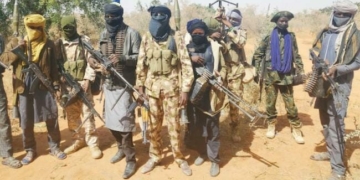- MSF reports a critical surge in malnourished children in seven northern Nigerian states, with admissions surpassing last year’s figures
- MSF urges urgent action to treat malnourished children, highlighting the need for long-term solutions to prevent recurring crises
Médecins Sans Frontières (MSF), also known as Doctors Without Borders, reports an overwhelming influx of severely malnourished children at its medical facilities in seven northern states.
As stated by MSF Field Communication Officer Abdulkareem Yakubu, the affected states include Kano, Bauchi, Borno, Yobe, Sokoto, Zamfara, and Kebbi. The global humanitarian organization noted that its in-patient facilities in Northern Nigeria have recently recorded an “extraordinary increase in admissions of severely malnourished children with life-threatening complications,” surpassing last year’s figures by over 100 percent in some locations.
MSF’s Country Representative in Nigeria, Simba Tirima, highlighted the alarming situation, describing it as an early peak of the lean season, typically anticipated in July. “Our facilities are full, children are dying, and immediate action is essential to save lives and allow the children of Northern Nigeria to grow free from malnutrition and its disastrous long-term if not fatal, consequences,” said Tirima.
MSF called for urgent humanitarian assistance, urging Nigerian authorities, international organizations, and donors to take immediate action to diagnose and treat malnourished children and engage in long-term initiatives to address the root causes of the crisis. “We’ve warned about the worsening malnutrition crisis for the last two years. 2022 and 2023 were already critical, but an even grimmer picture unfolds in 2024. We can’t keep repeating these catastrophic scenarios year after year. What will it take to make everyone notice and act?” questioned Tirima.
In April 2024, MSF reported that its medical team in Maiduguri, Borno State, admitted 1,250 severely malnourished children with complications to its in-patient therapeutic feeding centre, doubling the admissions of April 2023. By the end of May, the centre was urgently scaled up to accommodate 350 patients, far exceeding the 200 beds initially designated for the peak malnutrition season in July and August.
Similarly, the MSF-operated facility in Kafin Madaki Hospital, Bauchi State, recorded a 188 percent increase in admissions of severely malnourished children during the first three months of 2024 compared to the same period in 2023.
In Zamfara State, in-patient centres in Shinkafi and Zurmi saw a 30 percent increase in admissions in April compared to March, while Talata Mafara’s facility experienced a 20 percent increase. Major cities like Kano and Sokoto also reported alarming surges, with increases of 75 and 100 percent, respectively. The therapeutic feeding centre in Kebbi State documented a rise of over 20 percent in admissions from March to April.
Despite the dire situation, MSF stated that the humanitarian response remains inadequate. Other non-profit organizations active in the region are also overwhelmed. In May, the United Nations and Nigerian authorities issued an urgent appeal for $306.4 million to address the nutritional needs in Borno, Adamawa, and Yobe states. Still, this amount is deemed insufficient for the broader region.
In December last year, MSF temporarily evacuated some of its staff from facilities in Zamfara State, which residents fear might lead to serious setbacks in healthcare delivery, especially in rural areas.










Discussion about this post